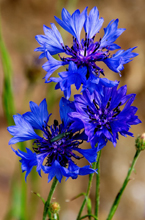
Seed Packets

Meadow Mixtures

Vegetable Seeds
|

Our Beehives
Sustainable Beekeeping
At Wild Garden Seeds
Our orchard apiary contains 5 hives of honeybees. The bees are
managed using sustainable beekeeping methods and without impacting other wild
pollinators. Our bees help to pollinate local fruit trees, farm crops and many
wild flowers in our area. Occasionally we sell small amounts of honey
produced by our bees, see below.
|
History
Honeybees throughout history have always been a valuable resource and have been kept
by humans since ancient times. For thousands of years the products of the
beehive have been harvested and used in many different ways, whether it be:
honey and propolis for food and medicinal purposes or beeswax for candles and
preserving. Beehives have taken many forms during this time, from the clay pipe hives
used in ancient Egypt, to the log hives in eastern Europe or the mud hives in
Siberia - and many more besides, all provided homes for kept bee colonies. In
Britain until the 19thc,
colonies of bees were kept in straw "Skep" hives and it was only
towards the latter part of the century that wooden movable frame hives were
introduced, in particular the double walled "WBC" hive invented by
William Broughton Carr in c1890, the design of which is still in use today.

"Skep" Hive |

"WBC" Hive |

"National" Hive |
However, the majority of managed bees in the UK are housed in cedar wood movable frame hives with the
"National" hive design being the most popular. This simple, if not
so quaint hive, emulates approximately the space needed by a colony of bees in
the wild and affords easy access to the colony by a beekeeper if required.
The Lifecycle Of The Honeybee
A colony of bees is made up of three kinds of bee: one queen, many thousands of
female worker bees and a few hundred male drone bees. It is the queen bee that
lays both the male and female eggs within the hive and she will live up to about
6 years. The worker bees, as the name suggests, are responsible for the
gathering of nectar and pollen. They are also responsible for producing the
propolis and wax for the creation of the bee nest itself. Drone bees have only
one purpose and that is to mate with queen bees, they have no duties within the
hive and are fed by the workers.
The life cycle of a worker bee is
relatively short, anything between 6 and 8 weeks, except at the end of summer a
remarkable thing happens, the "winter bees" are born. Unlike the
spring and summer bees these winter bees will live considerably longer in some
cases up to 6 months due to a slightly different physiology. It is these winter bees that will keep the colony going
not just through winter but also into the early part of the year when the queen
commences laying eggs again and the spring flowers begin to appear.
Honeybees In Britain
The wild honeybee population in Britain no
longer exists as it once did in the past. Current pests, diseases and the loss
of habitat mean that
honeybees are virtually non existent in the wild and therefore nearly all bee
colonies are looked after by
beekeepers.
Wild Garden Seeds Beehives
Here at Wild Garden
Seeds, in partnership with our local beekeeper, who looks after our bees
and has been a beekeeper for many years, we maintain 5 National style beehives.
The hives are located in our fruit
orchard in rural Monmouthshire and from spring onwards the bees can freely access
our fruit tree blossoms of Apple, Pear, Damson and Plum whilst also foraging
across local meadows and farm crops. Typical wild flowers in this area which the
bees have been observed visiting are: borage, white & red clover,
cornflowers, oxeye daisy, yellow rattle, cowslips and many more.
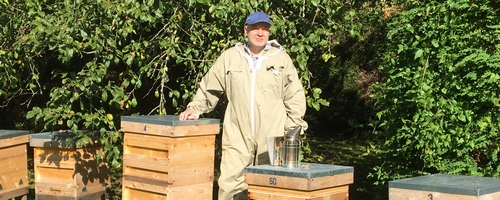
Sustainable Beekeeping
We keep bees for the following reasons: to help
contribute to a
healthy presence of honeybees
in the UK, for study and educational purposes, to help with pollination and to
provide a safe, pest and disease free home for colonies to flourish.
Our bees are managed on a not for
profit basis using sustainable
beekeeping methods utilizing the 5 following key principals:
- No exploitation of bees
- Minimal colony intervention (hive inspections
undertaken only when absolutely necessary)
- To maintain a small apiary of bees so as not to impact other local wild
pollinators
- To assist in the pollination of local fruit trees, farm crops and
wild flowers.
- No importation of bees (we
encourage the natural breeding and reproduction of local bees)
100% Pure Honey For Sale
Occasionally we sell some of our honey when our bees over produce and
there is an excess. Our amazing bees source the nectar locally to make delicious
natural pure honey. Our honey is cold extracted and not processed in any way (this is sometimes known as raw or pure honey) therefore retaining
all of the natural properties of pollen, enzymes and minerals which may provide many health
benefits some of which are listed below.
Some Facts & Figures About Honey
Honey never spoils, it crystallizes over time but is perfectly safe to eat.
Honey has been found in 3000 year old Egyptian tombs and was found to be still
edible.
Honey has many healing properties and has been used in hospitals for MRSA infections.
It can be used to help heal wounds, rashes and burns.
Eases sore throats and is good for coughs and colds.
Eaten everyday it can help to prevent hay fever.
Can be used to treat a hangover.
Has been used successfully to treat stomach ulcers.
Helps to stabilize blood pressure.
Can help to balance ph levels in the body.
Strengthens the immune system.
Sweeter than sugar, so use less in your cake recipes.
An excellent source of energy.
It may help to reduce symptoms of arthritis.
Many recipes benefit from the use of honey.
Can be used to treat mouth ulcers.
It is anti-inflammatory, anti fungal, antiseptic and has antibiotic properties.
And many more..
Our Own Locally
Produced Honey - In Stock
✓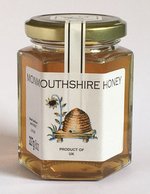
Our Honey is produced by our own bees foraging locally on wild
flowers and fruit blossoms. It is a clear honey with a
delicate flavour. It is completely natural with no additives.
(Note: Our honey
is labelled "Monmouthshire Honey" after the county in which our bees
forage).
All prices include postage.
|
For
larger quantities please contact us.
|
Gallery (click images to enlarge)

|

Seed Collections
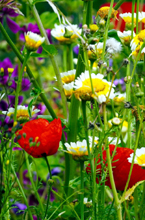
Wild Flower Calendar
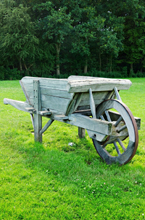
Delivery Information
|